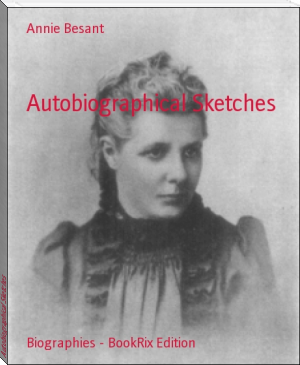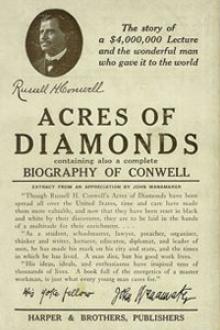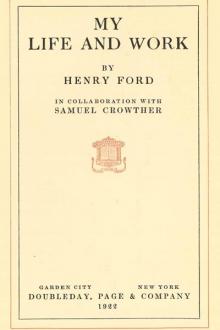Annie Besant - Annie Besant (free e reader .txt) 📗

- Author: Annie Besant
Book online «Annie Besant - Annie Besant (free e reader .txt) 📗». Author Annie Besant
So it will easily be understood that my religious wretchedness only increased the unhappiness of homelife, for how absurd it was that any reasonable human being should be so tossed with anguish over intellectual and moral difficulties on religious matters, and should make herself ill over these unsubstantial troubles. Surely it was a woman's business to attend to her husband's comforts and to see after her children, and not to break her heart over misery here and hell hereafter, and distract her brain with questions that had puzzled the greatest thinkers and still remained unsolved! And, truly, women or men who get themselves concerned about the universe at large, would do well not to plunge hastily into marriage, for they do not run smoothly in the double-harness of that honourable estate. _Sturm und Drang_ should be faced alone, and the soul should go out alone into the wilderness to be tempted of the devil, and not bring his majesty and all his imps into the placid circle of the home. Unhappy they who go into marriage with the glamour of youth upon them and the destiny of conflict imprinted on their nature, for they make misery for their partner in marriage as well as for themselves. And if that partner, strong in traditional authority and conventional habits, seeks to "break in" the turbulent and storm-tossed creature--well, it comes to a mere trial of strength and endurance, whether that driven creature will fall panting and crushed, or whether it will turn in its despair, assert its Divine right to intellectual liberty, rend its fetters in pieces, and, discovering its own strength in its extremity, speak at all risks its "No" when bidden to live a lie.
When that physical crisis was over I decided on my line of action. I resolved to take Christianity as it had been taught in the Churches, and carefully and thoroughly examine its dogmas one by one, so that I should never again say "I believe" where I had not proved, and that, however diminished my area of belief, what was left of it might at least be firm under my feet. I found that four chief problems were pressing for solution, and to these I addressed myself. How many are to-day the souls facing just these problems, and disputing every inch of their old ground of faith with the steadily advancing waves of historical and scientific criticism! Alas! for the many Canutes, as the waves wash over their feet. These problems were:--
(1) The eternity of punishment after death.
(2) The meaning of "goodness" and "love," as applied to a God who had made this world, with all its sin and misery.
(3) The nature of the atonement of Christ, and the "justice" of God in accepting a vicarious suffering from Christ, and a vicarious righteousness from the sinner.
(4) The meaning of "inspiration" as applied to the Bible, and the reconciliation of the perfections of the author with the blunders and immoralities of the work.
It will be seen that the deeper problems of religion--the deity of Christ, the existence of God, the immortality of the soul--were not yet brought into question, and, looking back, I cannot but see how orderly was the progression of thought, how steady the growth, after that first terrible earthquake, and the first wild swirl of agony. The points that I set myself to study were those which would naturally be first faced by any one whose first rebellion against the dogmas of the Churches was a rebellion of the moral nature rather than of the intellectual, a protest of the conscience rather than of the brain. It was not a desire for moral licence which gave me the impulse that finally landed me in Atheism; it was the sense of outraged justice and insulted right. I was a wife and mother, blameless in moral life, with a deep sense of duty and a proud self-respect; it was while I was this that doubt struck me, and while I was in the guarded circle of the home, with no dream of outside work or outside liberty, that I lost all faith in Christianity. My education, my mother's example, my inner timidity and self-distrust, all fenced me in from temptations from without. It was the uprising of an outraged conscience that made me a rebel against the Churches and finally an unbeliever in God. And I place this on record, because the progress of Materialism will never be checked by diatribes against unbelievers, as though they became unbelievers from desire for vice and for licence to do evil. What Religion has to face in the controversies of to-day is not the unbelief of the sty, but the unbelief of the educated conscience and of the soaring intellect; and unless it can arm itself with a loftier ethic and a grander philosophy than its opponent, it will lose its hold over the purest and the strongest of the younger generation.
CHAPTER V.
THE STORM OF DOUBT.
My reading of heretical and Broad Church works on one side, and of orthodox ones on the other, now occupied a large part of my time, and our removal to Sibsey, in Lincolnshire, an agricultural village with a scattered population, increased my leisure. I read the works of Robertson, Stopford Brooke, Stanley, Greg, Matthew Arnold, Liddon, Mansel, and many another, and my scepticism grew deeper and deeper as I read. The Broad Church arguments appeared to me to be of the nature of special pleading, skilful evasions of difficulties rather than the real meeting and solving of them. For the problem was: Given a good God, how can He have created mankind, knowing beforehand that the vast majority of those whom He created were to be tortured for ever? Given a just God, how can He punish people for being sinful, when they have inherited a sinful nature without their own choice and of necessity? Given a righteous God, how can He allow sin to exist for ever, so that evil shall be as eternal as good, and Satan shall reign in hell as long as Christ in heaven? Worst of all puzzles, perhaps, was that of the existence of evil and of misery, and the racking doubt whether God _could_ be good, and yet look on the evil and the misery of the world unmoved and untouched. It seemed so impossible to believe that a Creator could be either cruel enough to be indifferent to the misery, or weak enough to be unable to stop it. The old dilemma faced me incessantly: "If He can prevent it and does not, He is not good; if He wishes to prevent it and cannot, He is not almighty." I racked my brains for an answer. I searched writings of believers for a clue, but I found no way of escape. Not yet had any doubt of the existence of God crossed my mind.
Mr. D---- continued to write me, striving to guide me along the path which had led his own soul to contentment, but I can only find room here for two brief extracts, which will show how to himself he solved the problem. He thought me mistaken in my view
"Of the nature of the _sin_ and _error_ which is supposed to grieve God. I take it that sin is an absolutely necessary factor in the production of the perfect man. It was foreseen and allowed as means to an end--as, in fact, an education. The view of all the sin and misery in the world cannot grieve God any more than it can grieve you to see Digby fail in his first attempt to build a card-castle or a rabbit-hutch. All is part of the training. God looks at the ideal man to which all tends.... "No, Mrs. Besant; I never feel at all inclined to give up the search, or to suppose that the other side may be right. I claim no merit for it, but I have an invincible faith in the morality of God and the moral order of the world. I have no more doubt about the falsehood of the popular theology than I have about the unreality of six robbers who attacked me three nights ago in a horrid dream. I exult and rejoice in the grandeur and freedom of the little bit of truth it has been given me to see. I am told that 'Present-day Papers,' by Bishop Ewing (edited), are a wonderful help, many of them, to puzzled people; I mean to get them. But I am sure you will find that the truth will (even so little as we may be able to find out) grow on you, make you free, light your path, and dispel, at no distant time, your _painful_ difficulties and doubts. I should say on no account give up your reading. I think with you that you could not do without it. It will be a wonderful source of help and peace to you. For there are struggles far more fearful than those of intellectual doubt. I am keenly alive to the gathered-up sadness of which your last two pages are an expression. I was sorrier than I can say to read them. They reminded me of a long and very dark time in my own life, when I thought the light never would come. Thank God it came, or I think I could not have held out much longer. But you have evidently strength to bear it now. The more dangerous time, I should fancy, has passed. You will have to mind that the fermentation leaves clear spiritual wine, and not (as too often) vinegar. I wish I could write something more helpful to you in this great matter. But as I sit in front of my large bay window and see the shadows on the grass and the sunlight on the leaves, and the soft glimmer of the rosebuds left by the storms, I can but believe that all will be very well. 'Trust in the Lord, wait patiently for Him'--they are trite words. But He made the grass, the leaves, the rosebuds, and the sunshine, and He is the Father of our Lord Jesus Christ. And now the trite words have swelled into a mighty argument."
I found more help in Theistic writers like Grey, and Agnostic like Arnold, than I did in the Broad Church teachers, but these, of course, served to make return to the old faith more and more impossible. The Church services were a weekly torture, but feeling as I did that I was only a doubter, I kept my doubts to myself. It was possible, I felt, that all my difficulties might be cleared up, and I had no right to shake the faith of others while in uncertainty myself. Others had doubted and had afterwards recovered their faith; for the doubter silence was a duty; the blinded had better keep their misery to themselves.
During these weary months of anxiety and torment I found some relief from the mental strain in practical parish work, nursing the sick, trying to brighten the lot of the poor. I learned then some of the lessons as to the agricultural labourer and the land that I was able in after-years to teach from the platform. The movement among the agricultural labourers, due to the energy and devotion of Joseph Arch, was beginning to be discussed in the fens, and my sympathies went strongly with the claims of the labourers, for I knew their life-conditions. In one cottage I had found four generations sleeping in one





Comments (0)